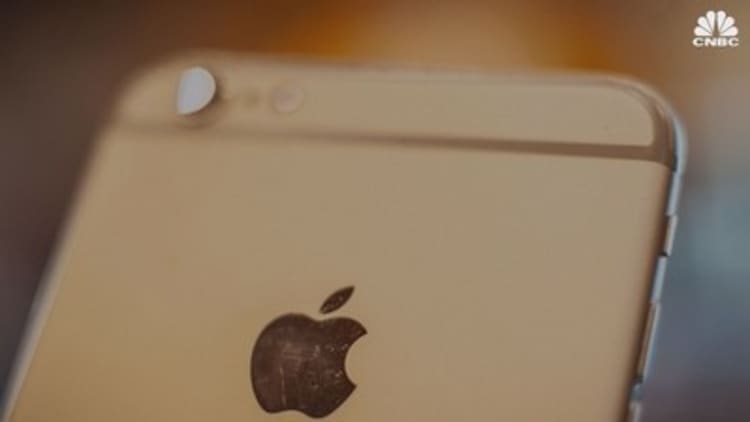Weaker demand for Apple products as well as a lackluster reception for the iPhone XR outside the United States will prevent shares from advancing over the next year, according to Goldman Sachs.
"In addition to weakness in demand for Apple's products in China and other emerging markets it also looks like the balance of price and features in the iPhone XR may not have been well-received," Goldman analyst Rod Hall said in a note Tuesday.
"Our estimates remain at the lower end of Apple's guidance range at this point as we believe the company likely included this more negative scenario in its provided range," Hall said.

Apple's stock fell 3 percent in early trading Tuesday following the analyst's note.
Goldman Sachs reiterated its neutral rating on Apple shares and cut its price target to $182, down from $209. That implies 2 percent downside over the next year. Shares of Apple fell back into a bear market on Monday as growing concerns surrounding iPhone production weighed on the stock.
Apple shares have fallen more than 20 percent from its 52-week high of $233.47, losing about $276 billion in market cap as its stock slid to $179.32 Tuesday morning. For perspective, that's about the same market value of all of Walmart. The company is still the most valuable publicly traded company in the world, worth about $850 billion.
"While it now seems that Apple may have miscalculated on the price/feature balance for the XR, we also believe that severe Chinese demand weakness in late summer and a stronger U.S. dollar were unexpected headwinds for the company that were difficult to predict," Hall wrote.
Goldman Sachs now sees Apple's earnings per year for calendar year 2019 at $13.40, roughly in line with the company's last three years next-12-month average.
Apple has cut production orders in recent weeks for all three iPhones launched in September, The Wall Street Journal reported Monday. The company stunned many analysts and investors on Nov. 1 when it said it will no longer break out individual sales numbers for the iPhone, iPad and Mac. The three main product lines will be wrapped into one reported revenue figure.
The iPad maker is morphing from a business propelled by the volume of devices it ships into one that stresses luxury products and software sales. That evolution has been marked by shockwaves for much of the technology space, with several of Apple's largest semiconductor suppliers noting marked declines in order volume.
Apple shares dropped by 5 percent last Monday alone after one of its chipmakers, Lumentum (LITE), said one of its largest customers reduced shipments. Though Lumentum, which makes 3D sensing lasers used in Apple's Face ID technology, did not mention Apple by name, Wall Street punished the iPhone maker as the prime suspect.
"You're talking not just about what Apple represents, but its effect across the whole food chain, including semiconductors," Wedbush analyst Daniel Ives told CNBC last week. "As the core 'FANG' names have just taken gut punches left and right over the past few months, this latest downturn for Apple — the degree of it — has really caught investors off base."
Apple's decision to no longer break out iPhone sales data, meanwhile, is being heralded as a signal that the phone maker may be expecting softer iPhone volumes in the future. The company has attempted to remedy the slowing volumes with pricier phones, but even those efforts appear to be reaching their limit, Goldman said.
"Apple's success with iPhone X demand this summer and then a relatively healthy start to the XS cycle this fall suggested to us that pricing power was still intact," Hall wrote. "However, the laboratory of the market now points to Apple being at the limit of their price premium for the iPhone. In our experience with mobile phones, when pricing power is lost, consumer technology companies tend to either lose margins or market share or both."


